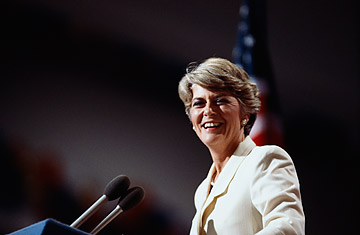
Geraldine Ferraro
There are two things to remember when we try to make out the lessons of Geraldine Ferraro's career. The first is overwhelmingly historic: as Democrat Walter Mondale's running-mate in 1984, the three-time Representative from New York was the first woman (and first Italian American) to be part of a major party's presidential ticket. The second is much more sobering: after Mondale's defeat, Ferraro never again won elected office. Making history lasted less than four months, from Mondale's announcement of her choice to be his vice-presidential candidate on July 19 to Ronald Reagan's landslide re-election on Nov. 6. The consequences of history would complicate the rest of her life.
Her brief star turn at the center stage of American politics had not really been part of the Ferraro's own plan. Logically, the next step would have been to turn her six years as a tough but efficient congresswoman into the first of many six-year terms as U.S. Senator from New York. But Mondale and the Democrats needed drama on the ticket to offset Reagan's overwhelming lead in the polls. So, why not a woman? A shortlist was drawn-up and, after much anticipation and last minute deliberation, Ferraro was picked over Dianne Feinstein, who was then Mayor of San Francisco.
Though she was unfamiliar to most Americans, Ferraro had the Washington qualifications for the job. Ambition and hard work had seen her rise in the esteem of her fellow Democrats in the Beltway. She was admired for the probing questions she asked from her seat on various congressional committees; she was a key player in the formulation of the party's platform and convention rules. Her back story too was bracing. The daughter of Italian immigrants, Ferraro pursued a law career when the profession was overwhelmingly dominated by men (she was one of two women in her graduating class). As assistant District Attorney in Queens, New York, she was in charge of the Special Victims Bureau, overseeing cases involving child and spousal abuse. Though married to the realtor John Zacarro, she continued to use her family name in her work, she said, to honor the mother who, after the death of Geraldine's father, had kept the family going.
The choice electrified the contest — for a while. Women cheered. It was a bit of salve over the still fresh disappointment over the failure of the country to ratify the Equal Rights Amendment by a 1982 deadline. The bounce of attention and initial admiration for the historic choice moved Mondale up in the polls, bringing him about even with Reagan and his running mate George H. W. Bush.
And then the big political lesson of the Ferraro choice emerged: Vetting. Not enough of it had been done of the finances of Ferraro and her husband. Ferraro and Zaccaro had always filed separate tax returns and his reluctance to make his returns public became an immense issue that quickly diminished the Mondale-Ferraro bounce in the polls. Though Ferraro was mostly adept at parrying questions from the press, the Vice-Presidential candidate did not help herself — and feminism — by trying to explain away her husband's reticence by saying, "You people who are married to Italian men, you know what it's like." The debacle lasted until late August, when Zacarro finally relented. No financial improprieties were discovered though Ferraro had to pay the IRS $53,000 for what she said was an accounting error. The fact that the couple was worth $4 million seemed to shock some people. Barbara Bush, the vice-president's wife, who was hardly poor herself, made her infamous remark, describing Ferraro as "that four-million-dollar — I can't say it, but it rhymes with 'rich.'" She would apologize for the remark but the tax returns controversy had erased any momentum the Mondale-Ferraro ticket may have had.
